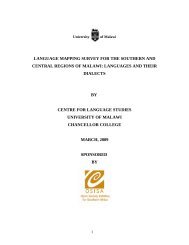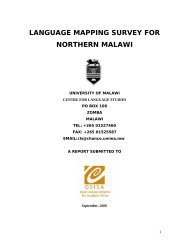SOCIOLOLINGUISTIC SURVEYS - Centre for Language Studies
SOCIOLOLINGUISTIC SURVEYS - Centre for Language Studies
SOCIOLOLINGUISTIC SURVEYS - Centre for Language Studies
Create successful ePaper yourself
Turn your PDF publications into a flip-book with our unique Google optimized e-Paper software.
There were 19 cases of respondents who were aged below 20 who were also put in the<br />
category of parents/guardians because they could not fit in any of the other groups due to<br />
certain personal peculiarities.<br />
5.5.2.1 SEX<br />
Out of the 239 interviewees, 106 (44.4%) were male and 128 (53.6%) were female.<br />
There were 5 (2.1%) cases which were inadvertently not documented.<br />
5.5.2.2 QUALIFICATIONS<br />
The educational background of the respondents was as shown in Table 77.<br />
Table 77:<br />
Parents/Guardians’ Qualification<br />
Level of Education No. of Respondents Percentage<br />
No <strong>for</strong>mal education 88 36.8<br />
Below PSLC 98 41<br />
PSLC 26 10.9<br />
JC 13 5.4<br />
MSCE 10 4.2<br />
Diploma and Above 1 0.4<br />
There were 167 respondents (representing 69.9%) who indicated that they were<br />
Chilomwe speakers while 72 (30.1%) said they did not fully speak the language. The<br />
difficulty here is that there were some respondents who claimed not to speak Chilomwe<br />
but who, nevertheless, showed sufficient competence in the language when later<br />
presented with a proficiency test. This appears to have been so particularly with those<br />
who felt that their Chilomwe was mixed with some Chichewa but who strictly speaking,<br />
ought to have been regarded as Chilomwe speakers. This, there<strong>for</strong>e, means that in<br />
reality, the figure of 69.9% given above <strong>for</strong> Chilomwe speakers is an under<br />
representation.<br />
81





